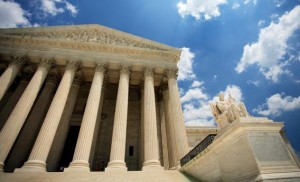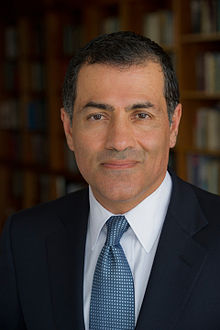The Marriage Equality Decisions
 The moment of truth has finally come on the long and tortured path through the Supreme Court for the marriage equality movement. Without further adieu, the Defense Of Marriage Act has been struck down as unconstitutional under Equal Protection grounds in a 5-4 opinion authored by Anthony Kennedy. A lack of standing has been found by the court in the California Hollingsworth v. Perry Prop 8 case, thus meaning the case will revert to the Ninth Circuit decision.
The moment of truth has finally come on the long and tortured path through the Supreme Court for the marriage equality movement. Without further adieu, the Defense Of Marriage Act has been struck down as unconstitutional under Equal Protection grounds in a 5-4 opinion authored by Anthony Kennedy. A lack of standing has been found by the court in the California Hollingsworth v. Perry Prop 8 case, thus meaning the case will revert to the Ninth Circuit decision.
Frankly, everybody in the universe is going to have instantaneous analysis and opinion on the nature and import of these two decisions. I will likely be along with the same on particular aspects later, but for now I want to get the decisions and opinions up here so that one and all can read and discuss them. Below I will give the links to the opinions and the critical language blurbs from each.
United States v. Windsor (DOMA): Here is the opinion. As stated above, it is a 5-4 split authored by Justice Kennedy, joined by the liberal bloc of Ginsburg, Breyer, Sotomayor and Kagan. Chief Justice Roberts, Scalia, Thomas and Alito dissent in separate dissents written by Roberts and Scalia.
The opinion is very broad in range and focuses on Section 3 of DOMA, which will effectively obliterate the law. The key holding comes at the end of Kennedy’s majority opinion:
DOMA singles out a class of persons deemed by a State entitled to recognition and protection to enhance their own liberty. It imposes a disability on the class by refusing to acknowledge a status the State finds to be dignified and proper. DOMA in- structs all federal officials, and indeed all persons with whom same-sex couples interact, including their own children, that their marriage is less worthy than the mar- riages of others. The federal statute is invalid, for no legitimate purpose overcomes the purpose and effect to disparage and to injure those whom the State, by its marriage laws, sought to protect in personhood and dignity. By seeking to displace this protection and treating those persons as living in marriages less respected than others, the federal statute is in violation of the Fifth Amendment.
Hollingsworth v. Perry (Prop 8): Here is the opinion. As stated above, the court found a lack of standing by the appellants Hollingsworth (Prop 8 Proponents). ROBERTS, C. J., delivered the opinion of the Court, in which SCALIA, GINSBURG, BREYER, and KAGAN, JJ., joined. KENNEDY, J., filed a dissenting opinion, in which THOMAS, ALITO, and SOTOMAYOR, JJ., joined. So, just to be clear here: The liberals are the reason the court could not issue a decision granting ALL Americans the right to marriage equality that citizens in California, and the other few states who have state law marriage equality, will enjoy.
Anthony Kennedy, by his crystal clear decision and language he penned in the Windsor DOMA decision, and his willingness to find standing and rule on the merits in the Prop 8 case, was ready to make it happen. And all the liberal justices, save for Sonia Sotomayor, prevented it.
The court has remanded Hollingsworth back to the 9th Circuit with instructions to enter a similar ruling based on lack of standing/jurisdiction. That means that the broad and sweeping decision entered by Vaughn Walker in the district court trial will become law in California.
Now, to again be clear, I expect there will be litigation attempts by the Equality Haters to try to restrict Walker’s decision to the two plaintiff couples and/or the two respective counties at issue in the original Perry complaint. I do not believe that will bear any fruit and fully expect full marriage equality to exist across all of California, but it may not be as immediate as it should. We shall see.
In closing, a very good day for marriage equality and LGBT rights. The DOMA decision is broad and provides for heightened scrutiny in evaluating marriage and sexual identity issues; that portends well for future rights litigation. And, of course, DOMA is dead. Also heartwarming that all of California’s citizens will have their rights protected; it is, however, sad that this will not extend to all Americans.
[As always on these Prop 8 posts, the absolutely incredible graphic, perfect for the significance and emotion of the Perry Prop 8 case, and the decision to grant marriage equality to all citizens without bias or discrimination, is by Mirko Ilić. Please visit Mirko and check out his stock of work.]





